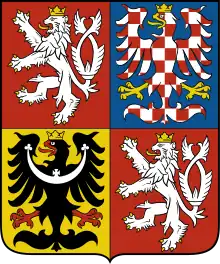Czech Republic–Slovakia relations
Czech Republic–Slovakia relations are foreign relations between the Czech Republic and Slovakia.
 | |
Czech Republic |
Slovakia |
|---|---|
Country comparison
| Official name | Czech Republic | Slovak Republic |
|---|---|---|
| Common name | Czechia | Slovakia |
Flag |
 |
 |
Coat of arms |
 |
 |
| Kde domov můj (Czech) |
Nad Tatrou sa blýska (Slovak)
| |
| 10,649,800 | 5,450,421 | |
| 78,866 km2 (30,450 sq mi) | 49,037 km2 (18,933 sq mi) | |
| 134/km2 (347.1/sq mi) | 111/km2 (287.5/sq mi) | |
| UTC+1 (CET) | UTC+1 (CET) | |
Government |
Unitary parliamentary constitutional republic | Unitary parliamentary constitutional republic |
Capital & largest city |
||
Official language |
Czech (de facto and de jure) | Slovak (de facto and de jure) |
First leader |
Bořivoj I, Duke of Bohemia (867–889, traditionally)
Václav Havel (1936-2011, current constitution) |
Pribina, Prince of Nitra (846–861, traditionally)
Michal Kováč (1930-2016, current constitution) |
Current head of government |
Prime Minister Petr Fiala (ODS; 2021–present) | Prime Minister Ľudovít Ódor (2023 – technocratic cabinet until early election) |
Current head of state |
President Petr Pavel (2023–present) | President Zuzana Čaputová (2019–present) |
Main religions |
44.7% Undeclared 34.8% Non-religious 10.5% Roman Catholic 6.8% Believers, not members of a religion 1% Protestant |
62.0% Roman Catholic 13.4% Non-religious 10.6% Undeclared 5.9% Lutheran 3.8% Greek Catholic |
Ethnic groups |
64.3% Czechs 25.3% Unspecified 5.0% Moravians 3.0% Other 1.4% Slovaks |
80.7% Slovaks 8.5% Hungarians 7.2% Unspecified 2.0% Roma 0.6% Czechs |
| $261.732 billion $24,569 per capita |
$111.874 billion $20,495 per capita | |
| $432.346 billion $40,586 per capita |
$209.186 billion $38,321 per capita | |
| Czech koruna (Kč) – CZK | Euro (€) – EUR | |
| 0.891 (very high) - 2017 | 0.857 (very high) - 2017 | |
Expatriates |
~150,000 Slovaks in the Czech Republic | ~37,000 Czechs in Slovakia |
History
Before 1918, both countries were part of Austria-Hungary; however, after the Ausgleich of 1867 the Czech lands belonged to the Austrian Empire while Slovakia belonged to the administratively separate Kingdom of Hungary. Between 1918 and December 31, 1992, both countries were part of Czechoslovakia.
Both countries established diplomatic relations on January 1, 1993. These international relations are usually referred to or described as "very good", "cordial", and "above standard" in the media. When a Czech or Slovak president is inaugurated, very often their first international visit is to the other part of the former country. The same custom applies to newly elected prime ministers of the Czech Republic and Slovakia.
Both countries are full members of NATO and of the European Union. There are around 200,000 people of Slovak descent living in the Czech Republic and around 46,000 people of Czech descent living in Slovakia. Gustáv Slamečka, a Slovak citizen, was a Minister of Transportation of the Czech Republic from 2009 to 2010 and in his office he exclusively used the Slovak language.
In December 2016 Slovak government ratified the Treaty of Cooperation on Mutual Protection of Airspace, which allows the use of Czech and Slovak military aircraft in the airspace of the other one and the possible reinforcement of one air force by its neighbour's counterpart in time of need. After the ratification from the Czech side, it came into effect in July 2017.[1]
Resident diplomatic missions
- The Czech Republic has an embassy in Bratislava.
- Slovakia has an embassy in Prague.
 Embassy of the Czech Republic in Bratislava
Embassy of the Czech Republic in Bratislava Embassy of Slovakia in Prague
Embassy of Slovakia in Prague
See also
References
- Gazdík, Jan (8 December 2016). "Unikátní armádní spolupráce je na světě. Češi a Slováci chtějí "společné" letectvo" (in Czech). Aktualne.cz. Retrieved 8 December 2016.